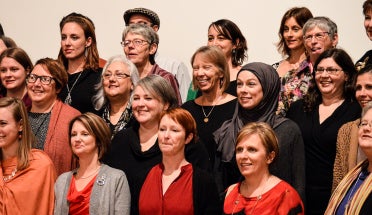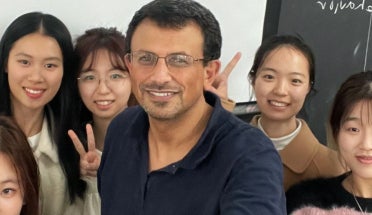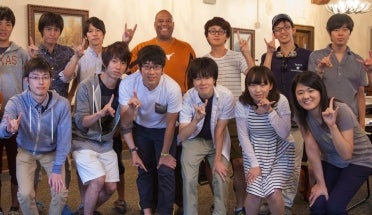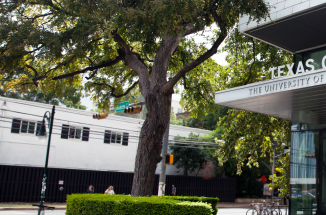
How this Brazilian Scholar Leveraged Her Academic English Program into a US Ph.D. Program
- Sep 20, 2019
- English Language Center
After attaining her Bachelor’s and Master’s degrees in her home country of Brazil, anthropology scholar Paula Batista wanted to make an impact in American academia and complete her Ph.D. in the U.S. To achieve her goals, she knew she needed to improve her English skills and chose the intensive Academic English Program at The University of Texas at Austin.
Batista says studying at UT Austin was a life-changing experience that allowed her to build strong connections with others in the academic world. During her time at UT, Batista quickly became connected to the Austin art community and was surprised to also find support among the many students knowledgeable of Brazilian political issues.
Her studies at the Texas Global English Language Center gave her the confidence to apply for Ph.D. programs in the U.S. as well as the English fluency she wanted to achieve. Not only did she complete her English program at UT, but she was accepted into the University of Michigan Ann Arbor anthropology Ph.D. program and will begin her degree this fall.
Batista shared with us her story as a student in the AEP program. Read about her experiences in both English and Portuguese.
Why did you choose to study at UT?
Por que você escolheu estudar na UT?
I based my decision on a series of criteria. First of all, I was looking for a top university with a great program in my area (Anthropology, Latin studies and gender and women’s studies), which is definitely the case of UT Austin. Also, the fact that Austin is a progressive and affordable city, with a great local art community, and a good weather, was a plus for me.
Eu baseei minha decisão em uma série de critérios. Primeiro, eu estava procurando por uma universidade de excelência, com um ótimo programa na minha área (Antropologia, América Latina e Estudos de Gênero), o que definitivamente é o caso da UT Austin. Além disso, o fato de que Austin é uma cidade progressista, com um custo de vida razoável e com uma ótima comunidade artística local, além de ter um clima agradável, foram aspectos importantes para mim.
How did the program help you improve your English?
Como o programa ajudou você a melhorar seu inglês?
We had classes every day and a considerable amount of homework, so there were no excuses not to be practicing my different English skills on a regular basis. That definitely made a difference. Also, the teachers are always available to answer any questions we may have, offering a great support.
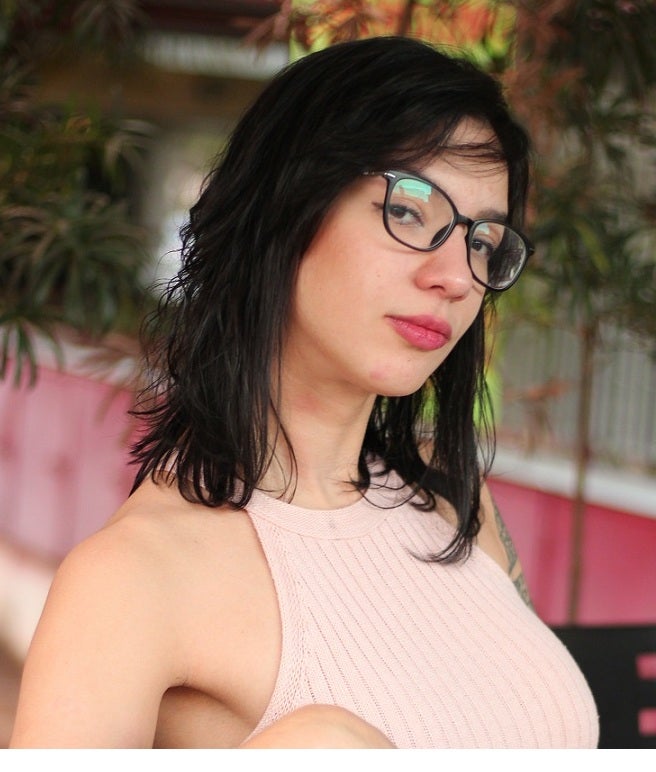
Nós tínhamos aulas todos os dias e uma quantidade considerável de dever de casa, então não havia desculpas para não praticar minhas diferentes habilidades em inglês. Isso definitivamente fez diferença em meu aprendizado. Além disso, os professores sempre estavam disponíveis para responder questões e oferecer um ótimo suporte.
How is studying English at UT different from studying English in Brazil?
Como estudar inglês na UT é diferente de estudar inglês no Brasil?
I believe that cultural immersion is an important step for anyone who wants to become fluent in any language. Of course there are great English programs in Brazil, but studying and living abroad shifts one’s way of thinking: after some months, for example, I was thinking in English and trying to articulate my ideas in this language. Also, at UT I had the chance to improve my pronunciation, as I was always practicing my English with native speakers or with foreign students.
Eu acredito que a imersão cultural é um passo importante para qualquer pessoa que queira se tornar fluente em alguma língua. Claro que há bons programas de inglês no Brasil, mas estudar e morar fora altera o modo como alguém pensa: depois de alguns meses, por exemplo, eu estava pensando em inglês e tentando articular minhas ideias nesse idioma. Além disso, eu tive a oportunidade de trabalhar minha pronúncia, considerando que eu sempre estava praticando meu inglês com falantes nativos ou estudantes de outros países.
How did the program help you prepare for future study?
Como o programa ajudou você a se preparar para futuros estudos?
Because the activities proposed by the program were academic focused, I had the opportunity to work on specific areas that really matter to me, such as academic oral presentations and the structures of academic papers. Also, it really helped me to overcome my anxiety of working on my applications to universities. Most of all, having the experience of studying in a top north-American university gave me the confidence I needed to see myself as part of the American academic community, and to work hard to make this come true with my PhD applications.
O fato de as atividades propostas pelo programa terem um foco acadêmico me ofereceram a oportunidade de trabalhar em áreas específicas que são importantes para mim, como apresentações acadêmicas e estruturas de artigos científicos. Além disso, o programa também me ajudou a superar minha ansiedade durante o processo de inscrição para as universidades. Mais importante, a experiência de estudar em uma universidade norte-americana de excelência me proporcionou a autoconfiança necessária para me enxergar como parte da comunidade acadêmica norte-americana, e para trabalhar duro para que isso se tornasse realidade em meu PhD.
What did you like best about it?
O que você mais gostou sobre isso?
Besides the English course itself, the access to UT and its facilities were a dream come true to an academic like me. It was my first time having access to a 24-hour library, so I cannot even count how many hours I spent studying at the UT Perry Castañeda Library, or how many great lectures, seminars and roundtables I was fortunate to attend.
Além do curso do inglês, o acesso à estrutura da UT era um sonho realizado para uma acadêmica como eu. Essa foi a primeira vez que tive acesso a uma biblioteca aberta 24 horas, então eu perdi a conta de quantas horas eu passei estudando na biblioteca Perry Castañeda, ou de quantas ótimas palestras, seminários e mesas-redondas eu pude participar.
What was your biggest surprise?
Qual foi sua maior surpresa?
I was surprised to see how many academics at UT were transnational allies and connected to the Brazilian political issues. For example, the day after the election of president Bolsonaro in Brazil, there was a roundtable at UT to discuss the results of the elections, the future of Latin America and the rising of the right-wing populism. As a Brazilian anthropologist, I felt supported to know that our issues matter to many scholars on this side of the world, especially in a moment like now, when science is facing a political crisis in Brazil.
Surpreendeu-me perceber o apoio transnacional de acadêmicos na UT em relação a questões políticas brasileiras. Por exemplo, no dia seguinte às eleições do presidente Bolsonaro no Brasil, houve uma mesa-redonda na UT para discutir o resultado das eleições, o futuro da América Latina e a emergência do populismo de extrema-direita. Como uma antropóloga brasileira, me senti apoiada em saber que nossas questões importam para muitos pesquisadores também nessa parte do mundo, especialidade em um momento como o atual, em que a ciência encontra-se em crise no Brasil.
What did you miss most from home?
O que você mais sente falta de casa?
My friends, my family... and food! My mother’s food, for sure.
Meus amigos, minha família... e a comida! A comida da minha mãe, com certeza.
What was life in Austin like? What kind of activities were you involved in?
Como era a vida em Austin? Em que tipo de atividades você estava envolvido?
My life in Austin was great. Austin has the both sides of what I like in a city, the nature and the urban atmosphere, all in the same space. The art community is amazing and I was fortunate to connect with like-minded people living there, both locals and foreigners, and we even had some art projects together. The music scene is also a plus and thanks to my Brazilian journalist friend Natasha Ramos, whom I met at the course at UT, I had the chance to photograph the show of some of my favorite bands from the backstage.
Minha vida em Austin era ótima. Austin reúne os dois lados do que gosto em uma cidade, a natureza e a atmosfera urbana. A comunidade artística é maravilhosa e eu tive a sorte de me conectar com pessoas (locais e estrangeiras) com quem eu dividia interesses em comum. Nós tivemos inclusive projetos artísticos juntos. A cena musical é outra vantagem. Graças à minha amiga jornalista brasileira Natasha Ramos, que conheci durante o curso na UT, eu tive a chance de fotografar de perto os shows de algumas das minhas bandas preferidas.
What is your advice to other students considering a U.S. education?
Qual é o seu conselho para outros estudantes considerando uma educação nos EUA?
If you have the opportunity to study abroad, go for it. It surely will provide you life-changing experiences. Don’t be afraid to be yourself. In the end, this is what matters, knowing who you are and being sure of what you want for your life. Moreover, remember: it’s about the journey, not the destiny.
Se você tiver a oportunidade de estudar fora, vá. Essa com certeza é uma experiência que transforma a vida de alguém. Não tenha medo de ser você mesmo. No fim das contas, o que importa é isso, saber quem você é e o que você quer pra sua vida. E lembre-se: é a travessia que importa, não o ponto de chegada.

